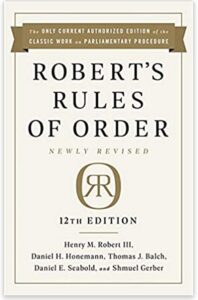 Per Article X in the GSUSA Constitution, the latest edition of Robert’s Rules of Order Newly Revised is the official parliamentary authority used for National Council Sessions (Source: GSUSA Bylaws/ARTICLE X/PARLIAMENTARY AUTHORITY). The 12th edition is most current version.
Per Article X in the GSUSA Constitution, the latest edition of Robert’s Rules of Order Newly Revised is the official parliamentary authority used for National Council Sessions (Source: GSUSA Bylaws/ARTICLE X/PARLIAMENTARY AUTHORITY). The 12th edition is most current version.
This section of the website will concentrate on providing an overview of what you would most likely encounter and witness at a National Council Session. It is suggested that you familiarize yourself with the basics of Robert’s Rules on your own in addition to using this section as a reference.
Much of what is presented in this section is from http://www.614ibew.com/Roberts_Rules.htm
General Principles of Parliamentary Procedure:
Every member of an organization should be familiar with the following simple rules and customs:
- All members have equal rights, privileges, and obligations; rules must be administered impartially.
- All members, majority or minority, have the right to full and free discussion of all motions, reports, and other items of business within time limits set by the assembly (for example, in standing rules or in adoption of a program or agenda).
- In doing business the simplest and most direct procedure should be used.
- Logical precedence governs introduction and disposition of motions.
- Only one question can be considered at a time.
- Members must be recognized by the chair before they may make a motion or speak in debate.
- No one may speak more than twice on the same question on the same day without permission of the assembly. No member may speak a second time on the same question if anyone who has not spoken on that question wishes to do so.
- Members must not attack or question the motives of other members. Customarily, all remarks are addressed to the presiding officer.
- In voting, members have the right to know at all times what motion is before the assembly and what affirmative and negative votes mean.
Summary of Steps When Handling a Motion:
Note: These are the rules that apply to most assemblies. We’ve made some notations about special circumstances that may apply to the National Council Sessions (NCS).
- A member rises and addresses the presiding officer.
- The presiding officer recognizes the member. In the NCS, Proposals (which are main motions printed in the Delegate Workbook) begin with this step.
- The member states the motion.
- Another member seconds the motion. No second is required if the motion in question has been approved by a committee or board.
- The presiding officer restates the motion, thus placing it before the assembly for consideration.
- The assembly may discuss the motion if it is debatable and amend the motion if it is amendable.
- The presiding officer takes the vote.
- The presiding officer announces the result.
